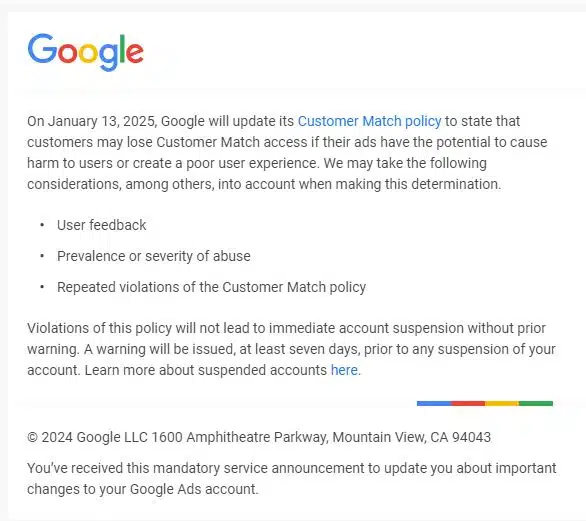Google tightens Customer Match rules, warns advertisers about privacy
Google is reinforcing stricter privacy rules for Customer Match, warning misuse could lead to immediate account suspension without warning.
Google is cracking down on Customer Match usage, warning advertisers that access to the powerful targeting tool is a “privilege, not a right.”
Big picture. As privacy regulations tighten globally, Google is taking a stronger stance on how advertisers use personal data for targeting from January.
What’s changing. Google is emphasizing three key areas that could trigger account suspensions:
- Consent violations:
- Using email addresses without explicit user permission
- Including users who have opted out of advertising
- Not having proper documentation of consent
- Creative compliance:
- No targeting of minors
- No personalized messaging that appears to single out specific users
- No targeting users who have explicitly opted out
- Account consequences:
- Violations can result in immediate account suspension
- No warnings or second chances indicated
Why we care. Customer Match allows you to use customer email lists for ad targeting and exclusion purposes. The warning signals Google’s increasing focus on privacy compliance and responsible advertising practices. Not complying will affect targeting and possible campaign performance.
Between the lines. The emphasis on consent and proper usage suggests Google is preparing for a stricter privacy landscape in 2024 and beyond.
What advertisers should do:
- Audit current Customer Match practices.
- Ensure proper consent documentation.
- Review targeting strategies for compliance.
- Include consent collection in 2025 planning.
First seen. Navah Hopkins, Brand Evangelist of Optmyzr, shared an email she received from Google on LinkedIn:

Bottom line. While most advertisers using Customer Match appropriately won’t be affected, the warning serves as a clear signal that Google is taking privacy violations seriously. Advertisers should prioritize consent collection and responsible usage to maintain access to this valuable targeting tool.
What’s next. Advertisers have time to adjust their practices but should begin implementing consent collection mechanisms if they haven’t already, particularly as part of their 2025 planning.
Related stories